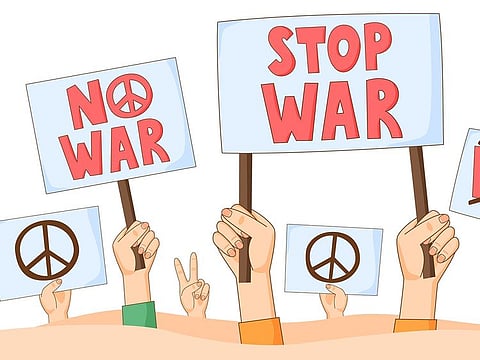Disappearance of anti-war movements raises concerns in the West
Even if anti-war voices cannot stop war, it is a check on war-happy leaders, limits danger

Recently, in an interview with a British news magazine that has got more than expected attention, I was asked why the anti-war movement has almost disappeared from the West. It is an extremely important question that must be thought through and explained carefully.
The US and Europe witnessed a rapid surge of anti-war movements in the 1960s and 1970s, opposing the Vietnam War. These movements, for decades, received widespread support from different socio-economic groups of the country and acted as a powerful deterrent against the trigger-happy governments, who often preferred war and militarisation over diplomacy and negotiation.
The end of the Cold War didn’t even end anti-war activism. During the Iraq War, the anti-war protest had a powerful presence, particularly in the US.
Fear of another World War
The world has witnessed a dangerous increase in violent armed conflicts in recent years. Many more people, particularly a large number of civilians, are dying because of war—the number of refugees soaring every year. Countries are buying weapons on an unprecedented scale as the global military expenditure has become more than $2.2 trillion per year.
The threat to use nuclear weapons has become a regular occurrence. More than anything else, for the first time in the last six decades, the world is helplessly witnessing a direct confrontation developing between NATO and Russia.
The Ukraine War, which started in February 2022, not only continues, but it has also become devastatingly destructive. While there is no end to this human misery in sight, the way NATO is being drawn into the conflict raises the real fear of another World War.
Despite the world staring at its self-destruction, the disappearance of the anti-War movement in the West is highly troubling. Anyone who opposes war and violence is indeed being painted as supporting authoritarianism and dictatorship. Anyone who opposes the military alliance or growing military expenditure is being projected as a traitor or a foreign agent.
But why does that sort of ‘name calling’ stop those who oppose the war and militarisation from joining the anti-war movements? These accusations and labeling had not stopped many from opposing the war in Vietnam, Afghanistan, or Iraq.
Why has the war in Ukraine become different? Is the location of the war or the time we live in forced the anti-war warriors to remain home and not come to the streets?
No war is a good war
If Ukraine, for being in the backyard, deters the peace activists of Europe, that argument doesn’t make much sense in explaining the absence of anti-war activism in North America. Racial closeness with the perceived victim to support the war is also not a convincing argument as these divides are absent between the two parties of this war.
What makes sense in understanding the mute mode of the proponents of peace is that civil society is almost convinced that Western liberal democracies are a force of good. They can do no wrong, particularly in their mission to protect democracies. So, for those who used to oppose wars, this war has become a good war.
It is important to note that no war is a good war. The US’s so-called war against terror in the last twenty-two years has directly killed nearly a million people and indirectly killed about four to five million, mostly innocent civilians.
War is not the only answer to a conflict. While countries in the West have been massively increasing their military expenditure, they have been brutal in cutting down the budget for diplomatic missions, diplomacy, and development aid.
Gaining the upper hand in the war has become so addictive that the countries in the West have forgotten the basic principles of humanitarian laws and norms and have no hesitation in supplying, using, and threatening to use mass killing weapons.
The absence of anti-war activism has given a free hand to the liberal democracies of the West, who are themselves suffering from democratic decline to wage wars in the name of protecting democracies against authoritarianism.
The disappearance of anti-war protests is not part of a general trend of the state of activism in the West. While peace activists have become endangered species, the West is thriving with the protest mobilization to fight against climate change, gender disparity, and racial discrimination.
Many activists and organisations who used to participate in the anti-war demonstration are now mobilising people on the issues of environment and identity.
This change of tactic is probably a safer option than being branded as a foreign agent with the rise of nationalist forces within the liberal democracies of Europe and North America. But they must realise that no society or country can prioritise sustainable development, gender and racial equality, and economic well-being while fighting a long-running war.
While almost everyone in the West talks about winning the war, unfortunately, no one is putting forward their voice on achieving peace. Even if the anti-war voices can’t stop the war, their presence is essential to keep the war-happy political leaders in check and limit the scope and dangers of a wider war.
Sign up for the Daily Briefing
Get the latest news and updates straight to your inbox




